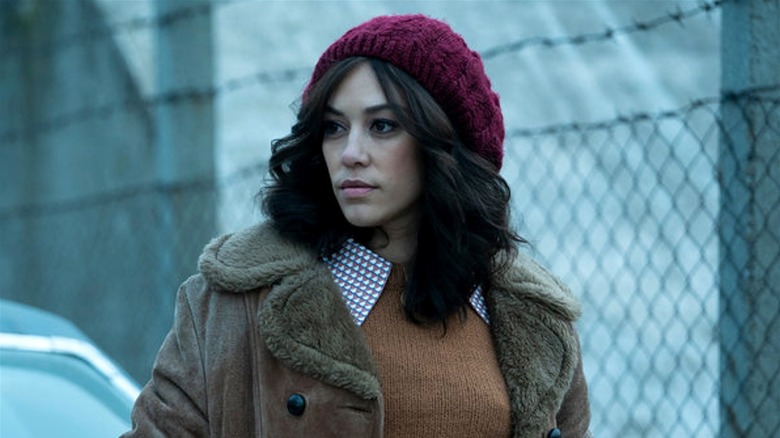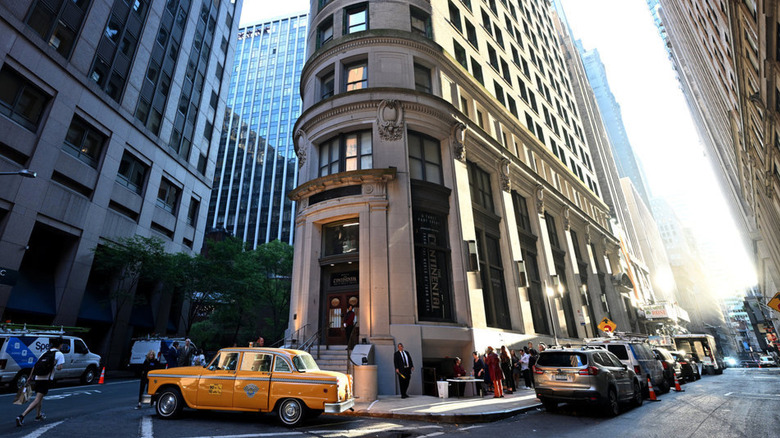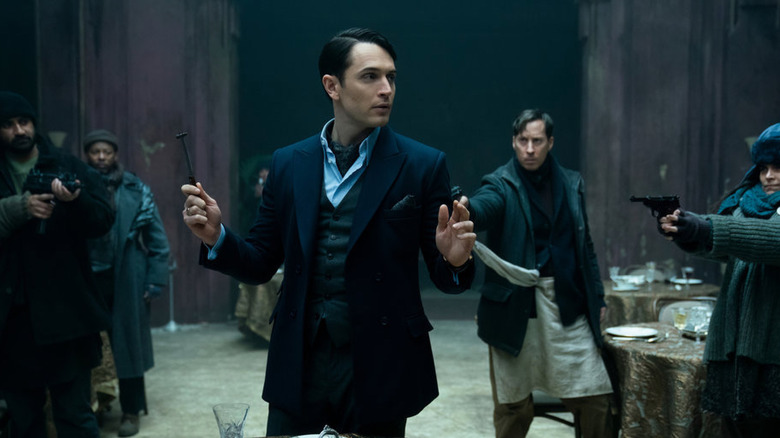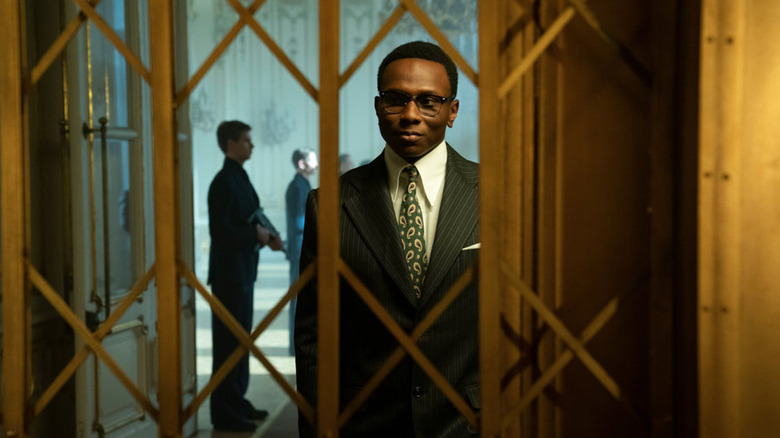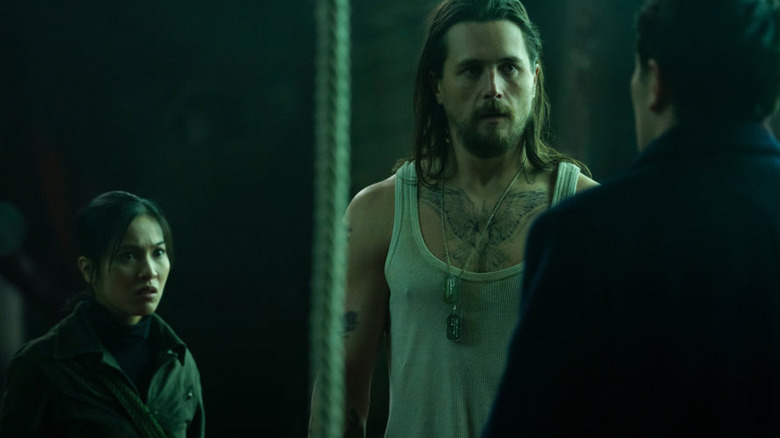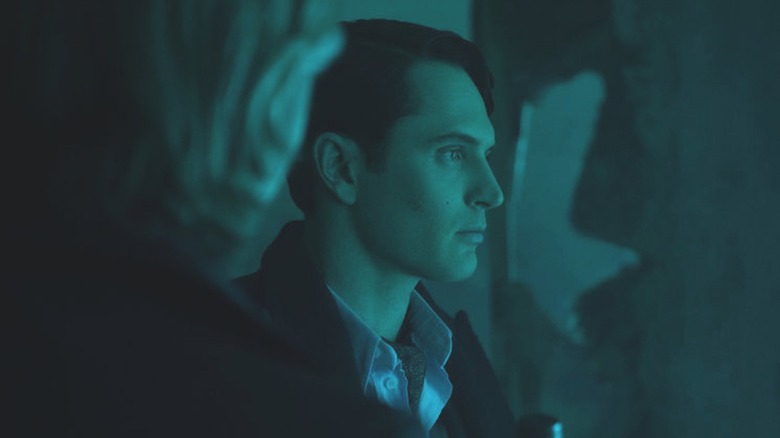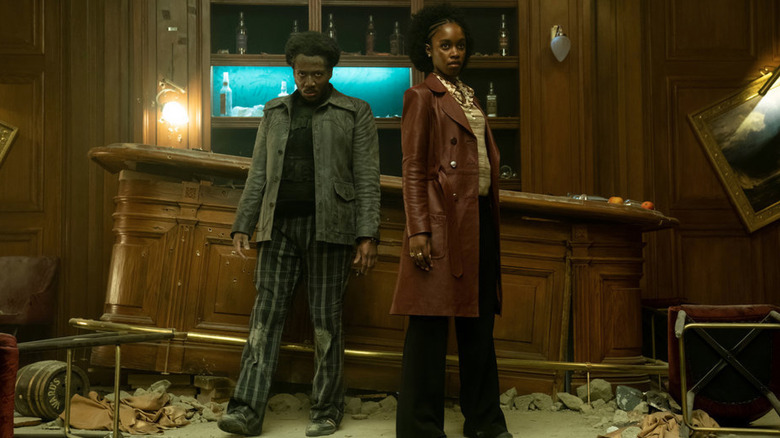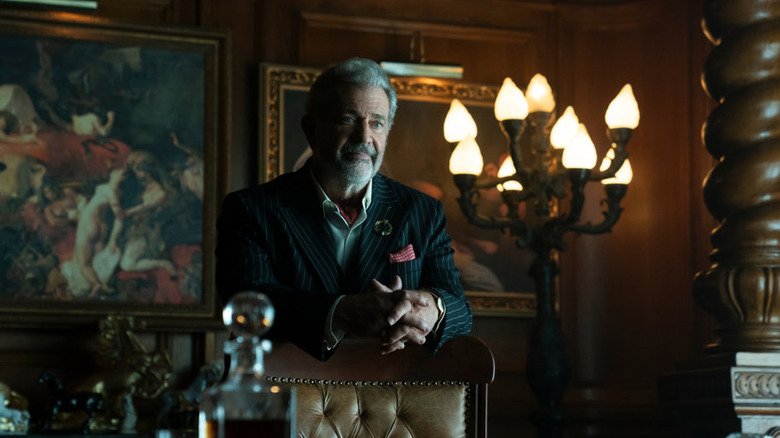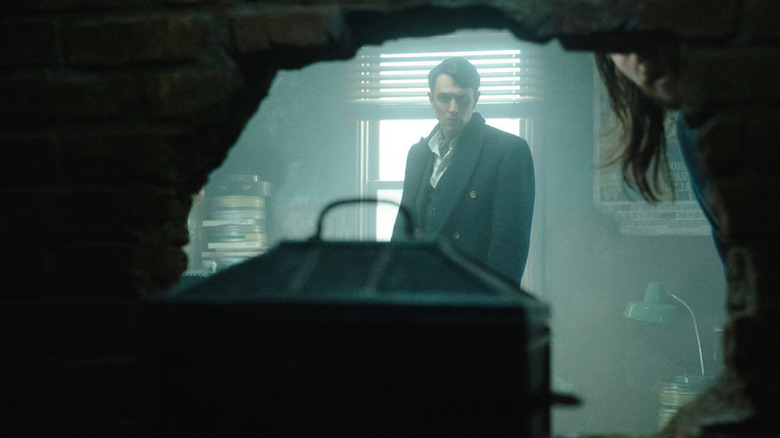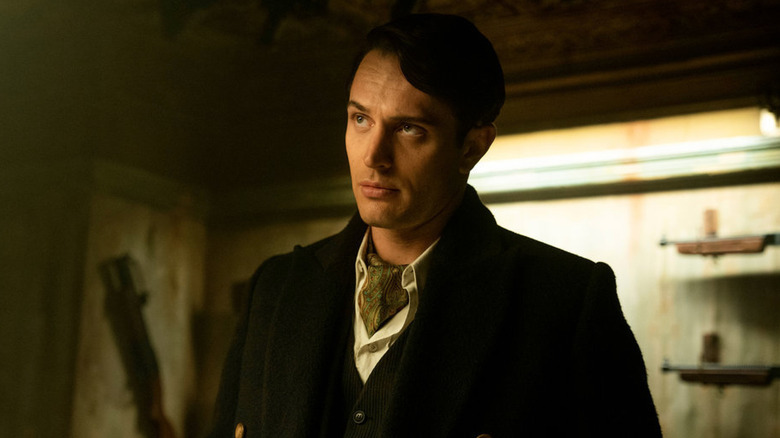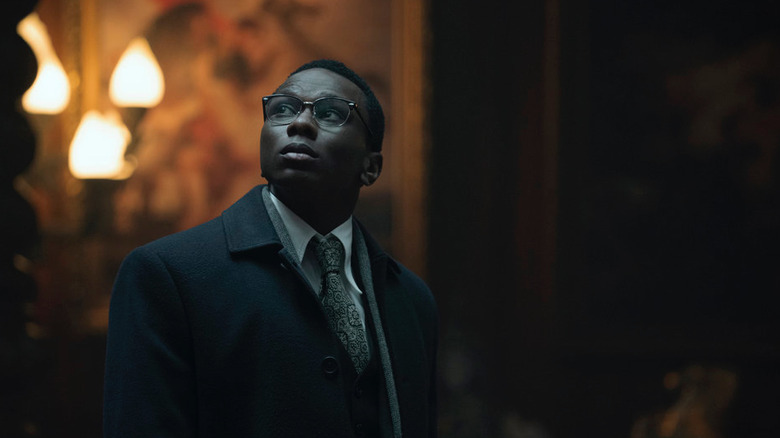The Ending Of Peacock's The Continental Explained
Contains spoilers for "The Continental," Episode 3
Everyone's favorite super-stylish, super-violent, and mythologically super-powered action franchise is back — and this time, it's streaming. Peacock's "The Continental" rewinds the assassin underworld tape back to the 1970s, 40 or so years before the events of the first "John Wick."
The three-part miniseries focuses on the man who would be king of The Continental: Winston Scott. Of course, "The Continental" shows Winston to us in ways we've never seen him before — namely younger, angrier, and chewing way less scenery than his older incarnation, indelibly played by Ian McShane. Over the course of the three mini-movies that make up "The Continental," Winston (Colin Woodell) assembles a team of vengeful avengers to take down the villainous Cormac O'Connell (Mel Gibson) and to take over The Continental itself. And don't worry, young Winston still wears an ascot.
By Episode 3, blood has been shed, lives have been lost, and a mysterious coin press has been leveraged against the arcane crime institution The High Table — but to what end? Has Winston really made good on his claims to avenge his brother and dish out justice for Cormac? Or has Winston sealed his fate, and kicked off the beginning of his own end? Tie another knot in your cravat and read on for the ending of Peacock's "The Continental" explained.
What you need to remember about The Continental in John Wick
There's plenty of lore about The Continental that carries over from the "John Wick" franchise into the world of Peacock's mini-series, but there are three key pieces to remember when considering the ending of "The Continental." One: business cannot be conducted on Continental grounds, meaning no blood can be shed on the property. When it comes to the rules of John Wick's world, this is pretty much number one with a bullet. Characters who have broken the rule have paid with their lives. Of course, this rule gets tricky treatment in "The Continental."
Two: The Continental is Winston the Elder's whole deal. It matters to him perhaps as much as life itself, and at times seems to even mean more. For the rest of the franchise, the fully-grown Winston and Charon (the late Lance Reddick) have a deep allegiance to the assassin hotel — one that seems hard to imagine at the end of "The Continental."
Three: in the rest of the "John Wick" franchise, and seemingly within the narrative of "The Continental," the actual hotel operates in service of The High Table, a widespread (and baroque as can be) crime lord supergroup that control fashion-forward crime syndicates all over the globe. So while Cormac "owns" The Continental in the mini-series, he likely only owns it via glorified supervillain squatter's rights. In "The Continental," as in the rest of the "John Wick" world, The High Table takes all.
What you need to remember about the plot of The Continental
"The Continental" kicks into high gear when young, successful Winston Scott gets kidnapped from swinging '70s London and dragged back to New York's Continental to do one last job for Cormac O'Connell, the ugly face of Winston's even uglier past. Winston and his brother Frankie (Ben Robson) have been stuck working for Cormac ever since they were kids. But as an adult, Frankie steals a valuable coin press from Cormac, who forces Winston to get it back or die trying.
Winston instead bands together with his estranged brother and his wife, Yen (Nhung Kate), to try and escape Cormac. Cormac's bloodthirsty twin assassins, Hansel (Mark Musashi) and Gretel (Marina Mazepa), give hot pursuit, and ultimately kill Frankie. This devastates Winston and Yen, and Winston asks her and Frankie's former ragtag gang of gun-runners to help him kill Cormac and steal The Continental. Winston is also hunted by detective KD (Mishel Prada) for crimes committed against her family in the past. Meanwhile, Cormac is pressured to find his blessed coin press by The Adjudicator (Katie McGrath).
It's only when Winston's crew partners with Cormac's seemingly loyal assistant, Charon (Ayomide Adegun), and the Bowery's leader, Mazie (Zainab Jah), that it seems the gang has a chance to take Cormac down. But when Cormac decides he'll take everyone down — literally — with his kamikaze "Defensionum" protocol, Winston and his merry band of misfits must race against time to beat Cormac at his own deadly game.
What happens at the end of The Continental?
Winston wins support from Mazie by offering her a story from his past, a new headquarters, and plenty of suits for work. But a vengeful KD tries to shoot Winston because he and Frankie burned down her family's home on Cormac's orders. Before KD can finish him, Cormac's goons take Winston to the Continental. It's curtains for Winston, until Charon betrays Cormac and we learn that getting captured was always part of Winston's plan.
But Charon can't bear to shoot Cormac to get the armory key they need. Cormac escapes, hunting for the secret Operations Room. He flips on the Continental's red light, allowing business to be done against Winston and his "inimicus" crew. Cormac kills Orson (Connor Crawford), the Operations Room worker, and uses the dead man's hand to enact "Defensionum," which needs both of their palms to work. The Continental seals itself off to prepare for self-destruction.
Cormac plans to flee, but KD shoots him when she hears how he pushed Winston and Frankie to become killers. Winston stops the self-destruct with moments to spare, by using Cormac's severed hand in the authenticator. The crew assembles, bloody and victorious, in the speakeasy, where everyone drinks to Lemmy (Adam Shapiro) and Frankie. The Adjudicator later arrives to take The Continental from Winston. He refuses, reveals that he gave the coin press to Mazie, and then kills The Adjudicator. He heads back inside to look over the city from his new home, The Continental.
What the end of The Continental means
The end of "The Continental" features our heroes fighting for their lives and future. Crew member Miles (Hubert Point-Du Jour) even says as much, when it looks like the furiously heartbroken Yen might lay down her sword to be with Frankie instead of continuing to battle Cormac's seemingly endless stream of evil assassins. "This whole operation is about finding a future, not ending it," Miles pleads with Yen. His words inspire her to fight so well that almost all of their crew lives to fight another day.
Ultimately, the end of "The Continental" is about a new family rising from the ashes of another. The crew Winston cobbles together becomes a true, if odd, little clan by the end of the episode. Of course, they're bound to be hunted by those they hurt during their hunt for vengeance. Defying fate and facing consequences for it — some things in the "John Wick" universe never change.
"It's a story of revenge and making amends for what I think is taken from [my character], and that's my love and my family," Colin Woodell told Empire. Winston chooses to protect Charon, The Continental, and his new crew — but it seems it is more out of a sense of wanting a real future than more revenge.
What does the end of The Continental mean for Winston and Charon?
The truth is, most people watching "The Continental" are coming to it knowing how things ultimately end for Winston and Charon in the "John Wick" movies. These two characters share such a deep bond in the films that it's almost jarring to see them only just become friends by the very end of "The Continental." But even though the end of the mini-series is only the start of their story, Winston and Charon clearly make a good team.
What's bittersweet about this dynamic duo is that they end "The Continental" with no awareness of how much that building will come to define their lives. These two characters end the mini-series truly thinking they can choose to leave The Continental, while the audience knows they never do, unless it is under extreme duress.
Also bittersweet, and more than a little heartbreaking, is how both men handle the High Table, violence, and vengeance in the ending of "The Continental" versus their relationship to all three in the "John Wick" films. While Charon's loyalty shifts from backstabbing Cormac to brother-like Winston, Winston undergoes a major change in relation to revenge. The older Winston tries to get John Wick to stop seeking vengeance to save his own life. But clearly, Winston young and old believes some loves — and losses — are too great not to break the rules for.
What does that final fight mean for all involved?
There are some pretty impressive fight sequences at the end of "The Continental," including Lou's fight with Mayhew (Jeremy Bobb) in a phone booth; Yen's rooftop showdown with Gretel; and the lights-out armory door fight, to name just a few. But the show's big final fight means more than just cool moments and Winston and Charon's victory over Cormac.
It's hard to have a "John Wick" spin-off without some gun-fu, but Lou initially refuses the way of the gun. Yet when Miles' story lines up with what the Orphan Master tells her about her dad, Hieronymus, Lou realizes all she knew about her father was a lie. He was actually a gun-toting villain, not the pacifist he claimed to be. When the little henchman known only as The Kid (Roy Hu) tosses her dad's special gun to her in the crucial moment, she doesn't hesitate. She saves her brother and herself, so the two can embark on a life with less secrets between them.
KD's fight for her justice ends when she lets Winston live. Even before KD walks off into the slowly-collapsing tunnel after she tells Winston, "Be seeing ya," her story sounds like a '70s swan song. But since she lives, who knows what might happen next. The same question mark hangs in the air for the delightful assassin Gene (Ray McKinnon) and his plant lady meet-cute. Possibility is in the air for everyone but Lemmy, who gets a hero's death — and a jester's parting ascot shot.
Why is Cormac so awful?
There are bad guys, and then there is Cormac O'Connell. Played with nasty, high-key menace and an almost cartoonish flair for villainy, Mel Gibson's portrayal is doing the most for a villain who might just make the least sense in the previously-established world of John Wick. Of course, this might be the whole point of Cormac.
The High Table of the "John Wick" universe puts an elegant, if hyper-stylized, spin on everything they do. These are villains who wear porcelain masks and communicate status changes via ornately-engraved medallions. Cormac, meanwhile, is a jumped-up mobster who beats people to death on Continental grounds, huffs what he calls fun fumes, and thinks he's clever when he tells his lackeys they need a "breath of fresh" before he makes them jump off his balcony. He also misreads the meaning of his Don Giovanni!
The waters are muddy around Cormac. He breaks the "no business" rule by killing on Continental grounds, but only bends the rule while trying to kill Winston and other henchmen. When he isn't doing his best impression of Dennis Hopper in "Blue Velvet," Cormac forces children to burn families alive, and all his henchmen to do his personal bidding. Perhaps the point of Cormac's wild selfishness is to illustrate how corrupt (and doomed) one can become when they do not follow the rules of the Table. As Winston himself says in "John Wick: Chapter 2": "Rules ... without them we live with the animals."
What happened with that coin press?
Hilariously, the most "John Wick" aspect of "The Continental" is the seemingly priceless ancient coin press that Cormac, the High Table, and a group called "the nihilists" are after. This flamboyantly oddball MacGuffin is apparently older than the Roman Empire and the lynchpin of underworld assassin society — even though it looks like something you might get at a gift shop in Colonial Williamsburg.
Why is this little gadget so important to the High Table? How will Winston giving it to Mazie help it stay with Mazie and her Bowery army? In later "John Wick" films we also see gold coins being made in Morocco — is that Winston's doing, or the High Table's? How does The Adjudicator seem to know everything that happens inside The Continental, except where her precious press has ended up?
The end of "The Continental" answers absolutely none of these questions. It does, however, give us a neat little scene where we see that Mazie puts the press into a bank vault, where it will stay safe — perhaps from the High Table, used only if Winston decrees it. It's never fun to poke holes in action franchise logic — but it is truly wild to think that the High Table could afford to build a double-palm-activated self-sealing building bomb in The Continental, but not figure out a more convenient way to make their little assassin coins.
What has the cast of The Continental said about the ending?
Colin Woodell has some big, elegant shoes to fill as young Winston in "The Continental." But Woodell is the first to admit that the ending of "The Continental" only hints at the comfortable, confident relish with which Winston will one day enjoy his position as hotel manager.
"I love Ian's embellishment [of the character], and how delicious everything is," Woodell told Empire. "To some degree we begin to get there at the end [of 'The Continental'] and you understand what motivates him, but I didn't get to really participate in that deliciousness." While Woodell isn't rolling the name "Jonathan" around his mouth as if it's made of rich chocolate by the end of "The Continental," viewers do see him exercise a bit of classic Winstonian flair, perhaps especially in the final scenes of the show.
When Winston shoots The Adjudicator in his first of at least two epic Continental-based killshots, he makes sure to do so just a teeny step "off" Continental grounds. He also utters a very quick "nuh-uh" to The Adjudicator's henchman, who hilariously, immediately takes the hint. The henchman tends to the body while Winston trots upstairs for a three-olive Martini — a drink even the older Winston is still known to find absolutely delicious.
What the end of The Continental could mean for the franchise
The many visual, tonal, and musical influences at play in "The Continental" might make fans of '70s New York movies and playlists stacked with disco and punk clamor for more sanitation-strike-era Winston Scott. But could there really be a sequel to the "John Wick" prequel? And if there is more of young Winston Scott's story to tell — will it be in the same decade?
According to "The Continental" producer and "John Wick" mainstay Basil Iwanyk, anything is possible in the world of "the accidental franchise," as he described the world of Wick to IGN. Plus director Albert Hughes has plenty of ideas.
Hughes, known previously for his directorial work with brother Allen Hughes, served as the sole director of Episodes 1 and 3 of "The Continental" (Charlotte Brändström directed Episode 2), and has hopes of working with "The Continental" showrunner Kirk Ward again. Hughes told IGN, "We just geek out over the '80s, and we actually have a plan for what would happen in the '80s. So that's exciting." The possibility of Winston and Charon doing semi-justified crimes to a soundtrack of "When Doves Cry" by Prince? That alone is worth a full-season order.
How does the end of The Continental stack up to the John Wick storyline?
40 years is a long time, especially in the revenge business. While audiences generally know where Winston ends his character journey in the "John Wick" films, there are still plenty of years — and question marks — between how Winston ends "The Continental" and the end of the movie timeline.
Winston seems to be one of the "good" bad guys at the end of "The Continental," having put together an ad hoc bunch of misfits and, barring a death or two, mostly kept them together. But even though young Winston only shows a tiny touch of megalomania at the end of the episode, future Winston bears a chilling resemblance to Cormac at times. Winston is obsessed with taking Cormac's house, which Cormac screams is his kingdom. Older Winston also calls The Continental his kingdom — "and mine alone" — in "John Wick: Chapter 2."
Winston at the end of "The Continental" is cocky and rebellious. So is Winston in the "John Wick" movies, but he's also entirely beholden to the Table. A serious smackdown must transpire between the end of "The Continental" and the start of the movies to get Winston there. Maybe future seasons will show that when Winston inherits Cormac's throne, he might break just as bad — perhaps until one young Mr. Wick arrives on the scene. Will he be the child of Yen and Frankie? Or — gasp — Yen and Winston? Tick tock, Mr. Wick. Let's at least get a Season 2.
